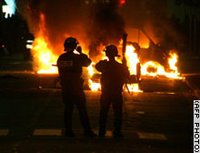While in New York, I scrounged around a few area publications, and found some interesting stuff.
The Village Voice looks at
all the ways that abortion is already being limited and restricted by laws and court rulings put in place since Roe v. Wade.
The L Magazine, a little glossy that as far as I can tell has nothing to do with lesbianism,
bemoans the "civil rights" record of SCOTUS nominee Sam Alito, which they call "so narrow it would make John Ashcroft blush."
Two other interesting points from this fairly well-written and interesting piece:
1. Author Noam Biale (nbiale@thelmagazine.com) says that overturning Roe is "the central aim of the
radical Christian movement that now controls the bulk of our government, save the courts." Riiiiggghhht. Sheesh, it sure is interesting to see the histrionics in the big L when they realize that Christians aren't just staying in church praying for Jesus to come back soon. The way they react, you'd think a bunch of pedophiles had been let out.
2. Biale screeds for 1,209 words and ends by saying,
"If the Democrats can stay on message and not allow the indictments, the cronyism, the scores of casualties at home and abroad caused by this administration to be forgotten, then they stand a good chance at winning back some ground in Congress, maybe even the White House."
This is the only hint of a point in Biale's piece. It is typical, I think, of Gen X communication. Increasingly, along with Gen Y and Z, we are more focused on cleverness and being "interesting" than on making a substantive point.
Biale basically complains, cleverly, about Alito for over 1,000 words, and then ends with the above statement. But what is the Democratic "message" he refers to, the proactive thrust of the big L's ideology? He mentions none. He only advises that the Democrats continue to harp on things they don't like about Bush, which are shaky, shaky criticisms at best.





